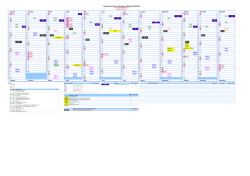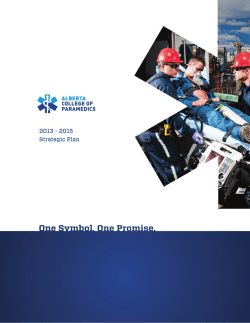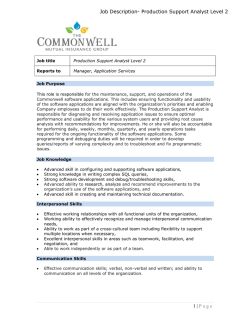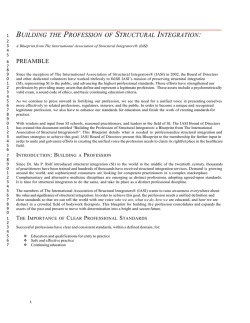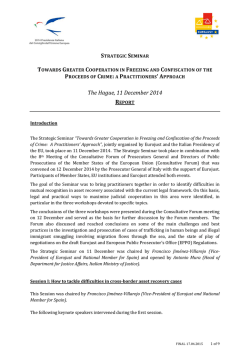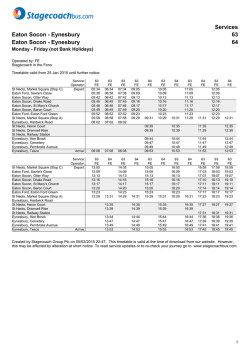
Training and Recertification Requirements for ABE Assessments
Training and Recertification Requirements For Massachusetts ABE Required Assessments Following are the basic requirements for Massachusetts ABE practitioners to administer and/or score required learning gains assessments and, where applicable, to recertify to administer and/or score in subsequent years. For further information, please refer to the Assessment Policy Manuals specific to each assessment, at http://www.doe.mass.edu/acls/assessment/ (under Policy). For all of the required assessments, a minimum of two staff per program must be trained to administer and score the relevant assessments before any testing of students can begin. Programs must maintain at least two trained staff at all times. Questions? Please contact one of the staff listed at the end of this document. BEST Plus Oral English Proficiency Test (To be used to test ESOL students whose Primary Assessment Area is Speaking and Listening) Initial Training and Certification In order for a practitioner to administer BEST Plus assessments to students, the following steps must be completed first: 1. The practitioner must attend a six-hour initial BEST Plus training. Following the training, she/he must be approved to continue the certification process by the BEST Plus initial trainer. Participants will be contacted within one week regarding their status. 2. Following approval, the practitioner must perform two tasks within three weeks of the initial BEST Plus training date: a) To ensure alignment with the BEST Plus scoring rubric, the trainee must complete a Scoring Activity using a Xerox copy of the score sheet in the BEST Plus Refresher Workbook, Test Administrator’s Edition, and the red CD entitled "BEST Plus Scoring Activities" from the Scoring Refresher Toolkit. The practitioner must complete the Scoring Activity with no help or discussion from others. The Scoring Activity to complete will be communicated at the training. b) To become comfortable with actual assessment administration, the trainee must perform 10 practice test administrations using the black CD entitled "BEST Plus Administrator Practice CD” from the Test Administration Guide. At least 5 of the practice administrations must be done with non-native English speakers; the remaining number may be done with colleagues, family, or friends. The trainee must fill out the Proficiency Development Form with the names of the 10 people tested, with the date and have it signed by the trainee’s program director. These 10 practice test administrations may not be used as actual pre-test assessments scores. Developed by SABES (System for Adult Basic Education Support) and ACLS (Adult and Community Learning Services, Massachusetts Department of Elementary and Secondary Education; updated January, 2015 1 The Scoring Activity and the signed Proficiency Development Form should be sent to Joan Ford, SABES director of assessment by mail, email, or fax within three weeks of receiving initial approval. If a test administrator does submit the scoring activity by the deadline, or by a preapproved extension date, he/she will not meet the requirements for certification and may not administer the BEST Plus Assessment. Contact information for Ms. Ford is at the end of this document. 3. Practitioners who pass the Scoring Activity and perform the 10 practice test administrations will receive competency status and be certified to administer the Best Plus assessment. Please note that no certificates will be given; please retain your email notification for this purpose. Practitioners may now purchase BEST Plus test administrations. Practitioners who do not pass the Scoring Activity will be contacted by Ms. Ford regarding remediation within two weeks. A "passing score" for the Scoring Activity is determined by the accuracy with which the practitioner uses each of the three sections of the BEST Plus scoring rubric, which assesses for students' basic listening comprehension, language complexity, and communication. The possible combinations of scores for the three sections are: R-R-R:* no remediation required R-R-A in any combination: no remediation required R-A-A in any combination: no remediation required A-A-A: remediation required U in any area: remediation required *(R = recertification recommended; A = acceptable but may need remediation; U = unacceptable) Remediation will be provided by Ms. Ford. If the practitioner remains unsuccessful, Ms. Ford will inform the practitioner and her/his Program Director that the practitioner must retake the initial training. 4. The status notification will indicate the valid through-date for administering BEST Plus assessments. The practitioner will be required to recertify by the end of February on a yearly basis. Annual Recertification In January of each year, ACLS will inform practitioners via the ACLS Monthly Mailing that staff currently certified to administer the BEST Plus will begin the recertification process in early February. In February, another notification will occur in the ACLS Monthly Mailing and in an email to program directors; the notification will state which Scoring Activity to complete using the BEST Plus Refresher Toolkit and the Workbook, Test Administrator’s Edition. Note: BEST Plus test administrators who have scored consistently in the “recommended” area for Listening Comprehension, Language Complexity and Communication in the annual recertification for the past 3 years will only need to recertify every 3rd year instead of every year. Practitioners who benefit from this change must also continue to test at least 20 students each year to maintain their fidelity to the BEST Plus scoring rubric. Ms. Ford will have a list by end of January 2015 of those test administrators who fall under this new category and do not need to recertify until FY17. Developed by SABES (System for Adult Basic Education Support) and ACLS (Adult and Community Learning Services, Massachusetts Department of Elementary and Secondary Education; updated January, 2015 2 All other BEST Plus test administrators will have one month to complete this activity. The Scoring Activity must be received by Ms. Ford by Friday, February 27, 2015. Every ESE-funded program has been given a set of the BEST Plus Refresher Toolkit and the BEST Plus Scoring Refresher Workbook for Test Administrators. If programs do not have these materials, please purchase them from the test publisher (for the $160. Toolkit: http://calstore.cal.org/Store/ProductDetails.aspx?productId=70; for the $7. Workbook, one per test administrator: http://calstore.cal.org/Store/ProductDetails.aspx?productId=81. Test administrators should use the Toolkit to review and recalibrate their scoring within a structured forum so that they can share their insights and questions about administering and scoring BEST Plus tests. For example, test administrators may view the Toolkit DVD either as a group with a facilitator (preferred method). If this preferred method is not feasible, practitioners may proceed individually. Ms. Ford will score and send notification of status (no certificates will be given; please retain your email notification) to directors or assessment coordinators by April 1st. The competency status will be valid for at least one year. Test administrators who do not return their Recertification Scoring Activity by this date will not be able to administer the BEST Plus until they re-take the initial BEST Plus training, refresher, and scoring activity. For more information and specific instructions on how to use the BEST Plus Toolkit, please refer to the BEST Plus Assessment Policy Manual, Appendix A, found at http://www.doe.mass.edu/acls/assessment, under “Policy.” TABE CLAS-E Writing Assessment (for ESOL students whose Primary Assessment Area is Reading and Writing) Initial Training and Certification Practitioners administering the test but not scoring the test may take the Administering the CLAS-E portion of the training only. Practitioners administering and scoring the test (or only scoring the test) must take both the Administering and the Scoring potions of the training, and be recertified annually. Staff who will be scoring CLAS-E Writing tests will need to score expository writing samples successfully to receive a competency status and be approved to score. If successful, Joan Ford, the SABES director of assessment professional development, will notify trainees of their competency status. Please note: no certificates will be given; please retain your email notification for that purpose. Competency status will be valid for at least one year. Practitioners who do not pass the initial certification will be contacted by Ms. Ford or SABES trainer to arrange for remediation. Developed by SABES (System for Adult Basic Education Support) and ACLS (Adult and Community Learning Services, Massachusetts Department of Elementary and Secondary Education; updated January, 2015 3 Annual Recertification February of each year, ACLS will inform practitioners via the ACLS Monthly Mailing that staff currently certified to administer the CLAS-E Writing will begin the recertification process in early March. In early March, another notification will occur in the ACLS Monthly Mailing and an email containing the recertification packet will be sent to program directors. Program Directors must distribute the packets to their Test Administrators as soon as they are received. Practitioners will have one month to score the expository writing samples and email, mail, or fax them to Ms. Ford by Tuesday, March 31, 2015. Test administrators who do not return their Recertification Packet by this date will not be able to score the CLAS-E Writing assessment until they re-take the CLAS-E Writing assessment training and re-do the recertification. By April 15, 2015, Ms. Ford will either notify program directors or assessment coordinator of their staff’s competency status or schedule a practitioner for remediation. Please note: no certificates will be given; please retain your email notification. Competency status will be valid for at least one year. Practitioners receiving their Initial Certification in FY’15 will not have to recertify until FY’16. TABE CLAS-E Reading Assessment (for ESOL students whose Primary Assessment Area is Reading and Writing) Initial Training and Certification There are two options for training: 1. Practitioners who have been certified by SABES (System for Adult Basic Education Support) to administer CLAS-E Writing may take a short online training which concludes with a short test. Practitioners who successfully pass the test will be certified to administer and score the CLAS-E Reading. 2. Practitioners that have not been certified to administer CLAS-E Writing need to attend a face-to-face training offered by SABES. Practitioners who are certified in CLAS –E Writing may also choose this option. Concluding the training, practitioners will take a short test. Staff successfully passing the test will be certified to administer and score the CLAS-E Reading. Please note: no certificates will be given; please retain your email notification. Trainees not passing the test will be given a second and final opportunity to pass it. Annual Recertification None required. Developed by SABES (System for Adult Basic Education Support) and ACLS (Adult and Community Learning Services, Massachusetts Department of Elementary and Secondary Education; updated January, 2015 4 MAPT (Massachusetts Adult Proficiency Test) MAPT for Reading and MAPT for Mathematics (for ABE students whose Primary Assessment Area is Reading or Math) Initial Training and Certification Practitioners must attend a three-hour training and familiarize themselves with the MAPT Computer Basics, Practice Questions and Sample Questions before administering the assessment to students. No staff are allowed to access or take MAPT tests themselves. Please note: Programs administering the MAPT must maintain at least two staff who were trained by SABES (e.g., not trained by other teachers at the program) at all times. SABEStrained teachers may train other teachers at their program; they must cover the same information and provide the same materials as the SABES-led three-hour training. Staff trained by other colleagues may not train others at their program. Annual Recertification None required. TABE (Tests of Adult Basic Education) Forms 9/10 Literacy Level (for ABE students who read below GLE 2, regardless of Primary Assessment Area) Initial Training and Certification Practitioners must attend a two-hour training. There is no final quiz or other form of certification. Note: SABES-trained teachers may train other teachers at their program in TABE Level L only. The in-house training must cover the same information and provide the same materials as the SABES-led training. Programs administering the TABE 9/10 must maintain at least two staff who were trained by SABES (e.g., not trained by other teachers at the program) at all times. Staff trained by other colleagues may not train others at their program. Annual Recertification None required. Developed by SABES (System for Adult Basic Education Support) and ACLS (Adult and Community Learning Services, Massachusetts Department of Elementary and Secondary Education; updated January, 2015 5 TABE (Tests of Adult Basic Education), Forms 9/10 Complete Battery Mathematics & Reading Sub-Tests (for ABE Programs in Correctional Institutions and Workplace Education (ABE) Programs whose Primary Assessment Area is Reading or Math) and TABE Forms 9/10 Complete Battery Language Sub-Test (for all ABE students whose Primary Assessment Area is Writing) Initial Training and Certification Practitioners must attend a three-hour training, and within two weeks of the training, and successfully pass a short test. Within one month, Ms. Ford will either notify them of their competency status or schedule time for remediation. Please note: no certificates will be given; please retain your email notification. Practitioners who do not pass the test will be given a second and final opportunity to pass it. SABES-trained staff may not train other staff at the program. Annual Recertification None required. CONTACT INFORMATION Joan Ford, SABES director of assessment professional development Email: [email protected] Phone: (774) 357-2190 Mailing Address: Bristol Community College, 777 Elsbree Street, Building Q, Fall River, MA 02720 Fax: (508) 730-3280 For MA ESE/ACLS: April Zenisky, Ph.D., senior research fellow, Center for Educational Assessment, University of Massachusetts, Amherst Email: [email protected] Dana Varzan-Parker: ESE/ACLS Program Specialist and Assessment Development Specialist Email: [email protected] Phone: (781) 338-3811 Developed by SABES (System for Adult Basic Education Support) and ACLS (Adult and Community Learning Services, Massachusetts Department of Elementary and Secondary Education; updated January, 2015 6
© Copyright 2026
